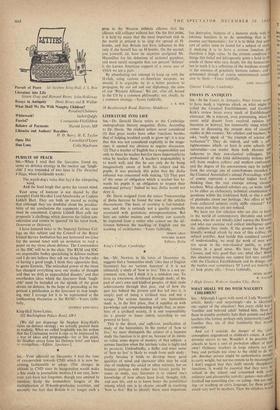SIR,—Mr. Newton, in his letter of Decemhcr 16, suggests that
a 'humanities study' (like that of English literature) has no 'serious function' if it is not ultimately a study of 'how to live.' This is a not un- common view, but I think it is a mistaken one. To have an awareness, developed through study, of the past of one's own and kindred peoples, of their main achievements through that past, and of how the past lies behind the present and has led into it, is simply. part of being a civilised man and not a savage. The serious function of any humanities study is, in the first place, that it supplies us with knowledge and comprehending insight that, as mem- bers of a civilised society, it is our responsibility (to a greater or lesser extent according to our powers) to have.
This is the direct, and sufficient, justification of study of the humanities. In the matter of 'how to live,' we must distinguish the subject of a humane study (its function is to give us, because of its intrin- sic value, some degree of mastery of that subject: a serious function when the intrinsic value is high) and its products. Undoubtedly, a fuller and truer sense of 'how to live' is likely to result from such study : partly because it tends to develop many good qualities of mind and character (this may be said also of studying the social or other sciences, but on balance, perhaps with rather less force); partly be- cause to study, say, literature is to extend one's knowledge of how others have lived, thought, felt, and seen life, and so to know better the possibilities among which one is to choose oneself in resolving 'how to live.' But to identify these most important. but derivative, features of a humane study with in intrinsic function is to do something that is 10 essence anti-humanistic : for it is to think that sonic sort of utility must be found for a subject of study' if studying it is to have a serious function and, therefore a high value. In the present condition 01 things this belief not infrequently gains a hold in (tic minds of those who care deeply for the humanities; but in truth it is a reflection of the insidious strength of the enemies of genuinely humane culture, and 3 substantial though of course unintentional conco. sion to them.---Yours faithfully,
Queens' College, Cambridge JOi IN I HMI


































 Previous page
Previous page